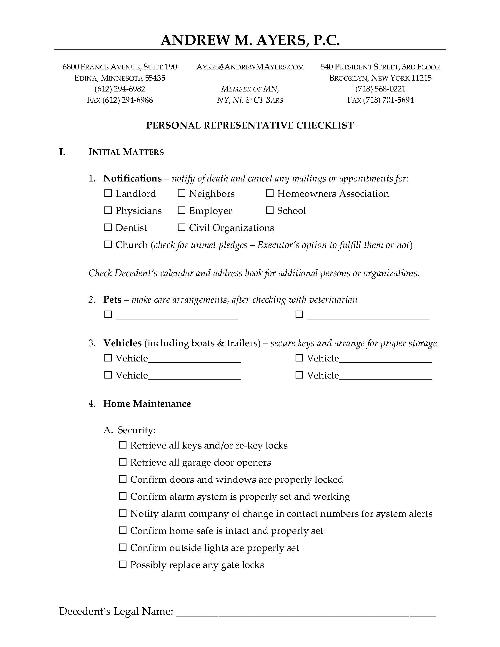 In Minnesota, the person who is appointed to manage your estate under your will is called a personal representative. In other states (like New York), this role is called an Executor of an estate. No matter where you live when it's time to create your estate plan, it's important to understand the roles of the important people in your documents. The comparison of a personal representative and a trustee can be an important decision even if you don't create a standalone trust (a separate document as part of your estate plan). If you have children under the age of 18, you may end up creating what's called a Testamentary Trust (a trust in your will that is only created when you die), and you'll still need to understand the difference between a trustee and a personal representative.
In Minnesota, the person who is appointed to manage your estate under your will is called a personal representative. In other states (like New York), this role is called an Executor of an estate. No matter where you live when it's time to create your estate plan, it's important to understand the roles of the important people in your documents. The comparison of a personal representative and a trustee can be an important decision even if you don't create a standalone trust (a separate document as part of your estate plan). If you have children under the age of 18, you may end up creating what's called a Testamentary Trust (a trust in your will that is only created when you die), and you'll still need to understand the difference between a trustee and a personal representative.
What's a Trustee?
If there's a trust as part of your estate plan, then you need to designate a trustee. The trustee is the person who will manage the assets of the trust and will distribute any assets that need to be distributed. You don't need to choose only 1 trustee, you can have multiple trustees (and many people do so that there is someone to act as a "check" to make sure the distributions that are made are proper). When married couples create trusts, they often choose themselves as the initial trustees and a third party only becomes a trustee when something happens to one (or both) of them.
One common misunderstanding that clients have is that they have to choose someone else to be the trustee. Unless it's a testamentary trust (one that is created after you are dead in which case you aren't around to be the trustee), you can and often should be the initial trustee of your trust. That way you can manage the trust assets while you are alive and leave behind a plan for your legacy.
What's a Personal Representative?
A personal representative (or executor if that's what your state calls it) is somebody who's appointed under the terms of your will to manage your estate after you are gone. Their first job after you've died is to take the original of your will and death certificate to your local probate court to advise them that you have passed away. If you're in Minnesota, which has "informal probate" the process is a streamlined and simplified process to make it easy for your personal representative to handle your estate. In other states without informal probate, the process can be long and intimidating and is a primary reason why people will try to use a trust to avoid the process at all costs.
If your estate plan has a trust, often the job of your personal representative is to take whatever assets you have at the time of your death that aren't already in your trust and make sure they get transferred into the trust.
Can They Be The Same Person?
One of the most common questions I get is,
Can they be the same person?
The simple answer is yes. It is not uncommon for the same person to serve in both roles for your estate plan, but you can also choose different people if you choose to go that route. Always remember that these documents and your estate plan are personalized to you (not some mail-merged website) and you should work with the professionals to make sure you've got the best person for each role.
You May Also Like
- Cryptocurrency and Your Estate Plan
- Talking With Your Family About Your Will
- What is a Testamentary Trust?
Next Steps
If it's time for you to create or update your Minnesota estate plan to make sure the probate court gets it right, let's set up a Legal Strategy Session to review the best options for you and your family. If you've been appointed as the personal representative of someone's estate, check out the Personal Representative Checklist for a good list of things to get you started.


